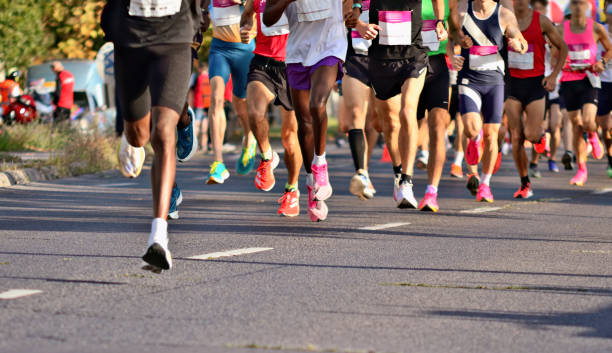
Training for a marathon is an ambitious endeavor. It takes a lot of time, dedication, and energy. Besides the workout part, calculating how many calories you burn during a marathon is a crucial aspect of your preparation. This is when you want to use our marathon calorie calculator. [https://triworldhub.com/?page_id=1531&preview=true]
Read on to learn how you can calculate calories burned to perform your best at your next race.
The number of calories burned during a marathon can vary significantly depending on several factors including your weight, pace, fitness level, and individual metabolic rate.
Let's explore these factors in more detail.
Heavier individuals typically burn more calories because they require more energy to move their bodies over the same distance compared to lighter individuals.
Each person's metabolism is unique and can impact how efficiently they burn calories.
For instance, someone with a naturally high metabolism might burn calories at a faster rate than someone with a slower metabolism, leading to potentially greater calorie expenditure during the race.
Faster running speeds require more energy expenditure and thus burn more calories per unit of time. Slower paces burn fewer calories over the same distance.
You can use our running pace calculator to determine your running pace. [https://triworldhub.com/?page_id=1531&preview=true]
Running on hilly terrain or uneven surfaces requires more effort and therefore burns more calories compared to running on flat ground.
For instance, tackling a marathon course with steep inclines and declines will likely result in higher calorie expenditure compared to running on a flat course.
Extreme temperatures, such as running in hot or cold weather, can increase calorie expenditure as the body works harder to regulate its temperature.
For example, running a marathon in hot and humid conditions may result in higher calorie burn due to increased sweating and energy expenditure.
Individuals who are more fit tend to be more efficient runners, meaning they may burn fewer calories for the same distance compared to less fit individuals. However, they may also run faster, which can offset this efficiency.
Muscles burn more calories than fat, even when you're not doing anything. So, people with more muscle might burn more calories naturally and during exercise.
Let's say two people, one with more muscle and one with more fat, both sit and watch TV for an hour. The person with more muscle will burn more calories just sitting there because their body needs more energy to maintain their muscles.
Similarly, when they both go for a walk, the person with more muscle will burn more calories during the walk too, because their muscles are working harder.
Proper hydration and nutrition before, during, and after the marathon can affect energy levels and overall performance, which in turn can impact calorie expenditure.
For instance, inadequate hydration or calorie intake during the race may lead to decreased energy levels and reduced calorie burn.
It's important to remember that these factors interact with each other, and the calorie expenditure during a marathon can vary significantly from person to person.
While estimates and calculations can provide a general idea, individual differences play a significant role in determining the actual number of calories burned.
On average, running a marathon burns between 2,500 to 3,500 calories for most individuals.
For a more accurate estimate, you can use online calculators or fitness trackers that consider your personal information, such as weight, pace, and distance covered.
Keep in mind that these are just estimates, and actual calorie expenditure may vary.

Calories burned during exercise can be calculated using various methods, with some being more accurate than others. Here are a few common approaches:
METs help us understand how much energy different activities use compared to when we're resting. Each activity has a MET value, like walking or jogging.
To estimate how many calories you burn doing an activity, you multiply your weight by the MET value of the activity and the time you spend doing it.
For example, if you weigh 70 kilograms and you jog at a moderate pace with a MET value of 7 for 1 hour, you would burn approximately 70 7 1 = 490 calories.
Many fitness trackers and mobile apps offer calorie burn estimates based on data such as your weight, height, age, gender, heart rate (if available), and the type and intensity of exercise.
These estimates often utilize algorithms and formulas to calculate calorie expenditure.
Some fitness trackers and heart rate monitors provide more accurate estimates of calorie burn by tracking your heart rate during exercise.
These devices use your heart rate data, along with other factors like age, weight, and gender, to calculate calories burned with greater precision.
Our calculator is a simple and intuitive tool that will help you calculate how many calories you burn during the marathon.
Simply select the activity, enter your current weight, training time and distance and achieve total calories burned. You can also use this calculator to estimate your future races. Knowing how many calories your body burns to finish a marathon or other race will help you adjust your diet.
However, these numbers may vary depending on multiple aspects.
Factors such as individual metabolism, fitness level, muscle mass, and environmental conditions can influence calorie expenditure.
Additionally, how much energy you spend during exercise is affected by factors like intensity, duration, and movement efficiency. Therefore, while these methods can give you a rough idea of calorie burn, they may not be precise.
Yes, a training calorie calculator can help with weight loss by estimating how many calories you burn during various types of exercise. Let's explore how it works.
Calories are units of energy that your body uses for everyday activities, including exercise. When you workout, you burn calories to fuel your muscles and keep your body moving.
Using a training calorie calculator will help you estimate how many calories you burn during different types of workouts. The results you'll get are based on factors like your weight, the type of exercise, and the duration of the activity.
By consuming fewer calories and burning more, your body will use stored fat as fuel, leading to weight loss. Hence, knowing how many calories you burn during exercise can help you create a calorie deficit, which is essential for losing weight.
Let's say you use a training calorie calculator and find out that you burn 300 calories during a 30-minute running session.
If you do this same running workout three times a week, you're burning an extra 900 calories each week. If you maintain a healthy diet and don't compensate for those burned calories by eating more, you'll create a calorie deficit, contributing to weight loss.
A training calorie calculator can also help you track your progress over time. As you become more active and your fitness improves, you may find that you can burn more calories during each workout, which can contribute to further weight loss.
Training for a marathon takes time and energy, and knowing how many calories you burn during it is crucial.
Our marathon calorie calculator helps estimate this.
You need to keep in mind that there are various factors affecting calorie burn. These include weight, pace, and fitness level.
These estimates vary among individuals.
A training calorie calculator can also be a helpful tool in your weight loss journey. It provides insight into how many calories you're burning during exercise and helps you create a calorie deficit for effective weight loss.
Do you have any questions about our calorie calculator? Don't hesitate to reach out. We're here for you.